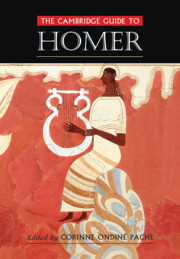Book contents
- The Cambridge Guide to Homer
- The Cambridge Guide to Homer
- Copyright page
- Contents
- Figures
- Notes on the Contributors
- General Introduction
- Part I Homeric Song and Text
- Part II Homeric World
- Part III Homer in the World
- Introduction
- Homer in Antiquity
- Homer and the Latin West in the Middle Ages
- Homer in Greece from the End of Antiquity 1: The Byzantine Reception of Homer and His Export to Other Cultures
- Homer in Greece from the End of Antiquity 2: Homer after Byzantium, from the Early Ottoman Period to the Age of Nationalisms
- Homer in Renaissance Europe (1488‒1649)
- Homer in Early Modern Europe
- The Reception of Homer since 1900
- Homer: Image and Cult
- Key Topics
- Bibliography
- Index
- References
Key Topics
from Part III - Homer in the World
Published online by Cambridge University Press: 22 February 2020
- The Cambridge Guide to Homer
- The Cambridge Guide to Homer
- Copyright page
- Contents
- Figures
- Notes on the Contributors
- General Introduction
- Part I Homeric Song and Text
- Part II Homeric World
- Part III Homer in the World
- Introduction
- Homer in Antiquity
- Homer and the Latin West in the Middle Ages
- Homer in Greece from the End of Antiquity 1: The Byzantine Reception of Homer and His Export to Other Cultures
- Homer in Greece from the End of Antiquity 2: Homer after Byzantium, from the Early Ottoman Period to the Age of Nationalisms
- Homer in Renaissance Europe (1488‒1649)
- Homer in Early Modern Europe
- The Reception of Homer since 1900
- Homer: Image and Cult
- Key Topics
- Bibliography
- Index
- References
- Type
- Chapter
- Information
- The Cambridge Guide to Homer , pp. 563 - 564Publisher: Cambridge University PressPrint publication year: 2020
References
Further Reading
Further Reading
Nardi 1949; Renucci 1954; Mazzoni 1965; Pagliaro 1967, esp. 371‒432; Martellotti 1973; Fubini 1976; Padoan 1977, esp. 170‒99; Kay 1980; Ahern 1982; Barolini 1984, esp. 228‒33; Barolini 1992, esp. 41‒60 and 105‒116; Boitani 1992; Brugnoli 1993; Seriacopi 1994, esp. 155‒91; Baldelli 1998; Hollander and Hollander 2000‒2008; Brownlee 2007; Freccero 2007; Wetherbee 2008; Baranski 2010.
Further Reading
For more detailed accounts of the Homeric Question and the Analyst and Unitarian approaches to the text, see the introduction by Adam Parry to the collected works of his father Milman Parry (1971) as well as Turner 1997. On the work of Parry and Lord, its implications, and its legacy in Homeric scholarship, see the introduction by Mitchell and Nagy to the second edition of Lord [1960] 2000, Foley 1997, and Dué and Ebbott 2010. For overviews of Neoanalysis, see Clark 1986; for the relationship between orality and Neoanalysis, see Kullmann 1991, Willcock 1997, Burgess 2006, Tsagalis 2011, and Montanari 2012.



